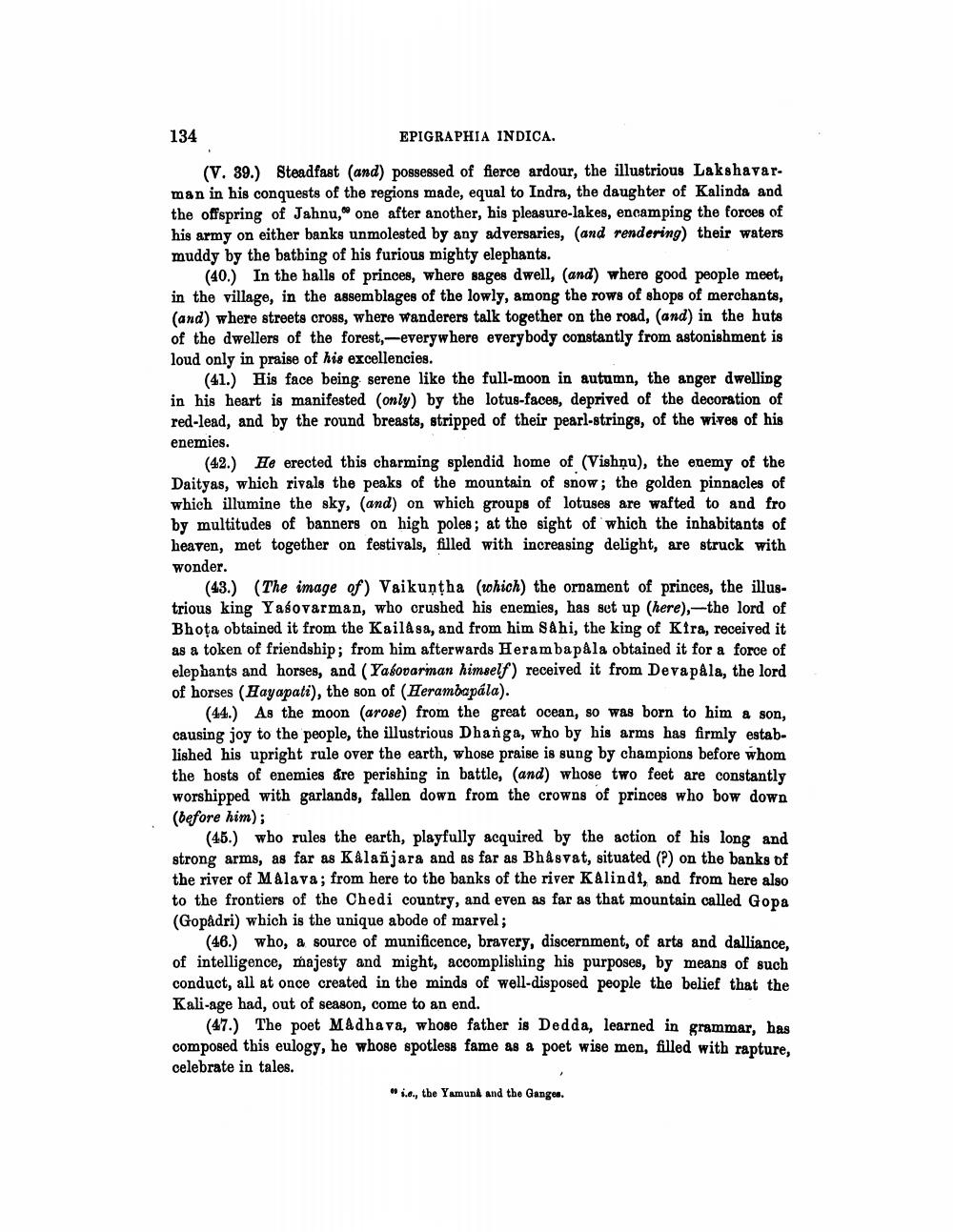________________
134
EPIGRAPHIA INDICA.
(V. 39.) Steadfast (and) possessed of fierce ardour, the illustrious Lakshavar. man in his conquests of the regions made, equal to Indra, the daughter of Kalinda and the offspring of Jahnu, one after another, his pleasure-lakes, encamping the forces of his army on either banks unmolested by any adversaries, (and rendering) their waters muddy by the bathing of his furious mighty elephants.
(40.) In the halls of princes, where sages dwell, (and) where good people meet, in the village, in the assemblages of the lowly, among the rows of shops of merchants, (and) where streets cross, where Wanderers talk together on the road, (and) in the huts of the dwellers of the forest,--everywhere everybody constantly from astonishment is loud only in praise of his excellencies.
(41.) His face being serene like the full-moon in autumn, the anger dwelling in his heart is manifested (only) by the lotus-faces, deprived of the decoration of red-lead, and by the round breasts, stripped of their pearl-strings, of the wives of his enemies.
(42.) He erected this charming splendid home of (Vishņu), the enemy of the Daityas, which rivals the peaks of the mountain of snow; the golden pinnacles of which illumine the sky, (and) on which groups of lotuses are wafted to and fro by multitudes of banners on high poles; at the sight of which the inhabitants of heaven, met together on festivals, filled with increasing delight, are struck with wonder.
(43.) (The image of) Vaikuntha (which) the ornament of princes, the illustrious king Yasovarman, who crushed his enemies, has set up (here).-the lord of Bhota obtained it from the Kailasa, and from him Sahi, the king of Kira, received it as a token of friendship; from him afterwards Herambapåla obtained it for a force of elephants and horses, and (Yasovarman himself) received it from Devapala, the lord of horses (Hayapati), the son of (Herambapála).
(44.) As the moon (arose) from the great ocean, so was born to him a son, causing joy to the people, the illustrious Dhanga, who by his arms has firmly established his upright rule over the earth, whose praise is sung by champions before whom the hosts of enemies are perishing in battle, (and) whose two feet are constantly worshipped with garlands, fallen down from the crowns of princes who bow down (before him);
(45.) who rules the earth, playfully acquired by the action of his long and strong arms, as far as Kalañjara and as far as Bhasvat, situated (?) on the banks of the river of Malava; from here to the banks of the river Kalindi, and from here also to the frontiers of the Chedi country, and even as far as that mountain called Gopa (Gopådri) which is the unique abode of marvel;
(46.) who, a source of munificence, bravery, discernment, of arts and dalliance. of intelligence, majesty and might, accomplishing his purposes, by means of such conduct, all at once created in the minds of well-disposed people the belief that the Kali-age had, out of season, come to an end.
(47.) The poet Madhava, whose father is Dedda, learned in grammar, has composed this eulogy, he whose spotless fame as a poet wise men, filled with rapture, celebrate in tales.
"1.o., the Yamuna and the Ganges.




